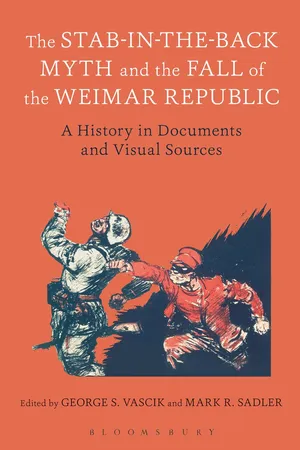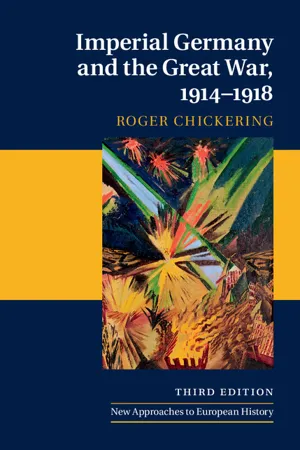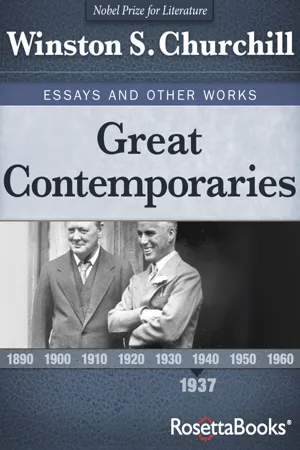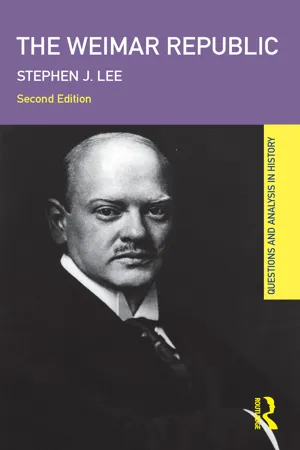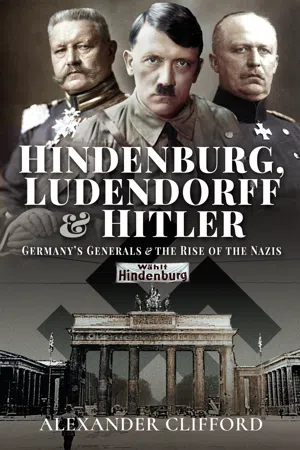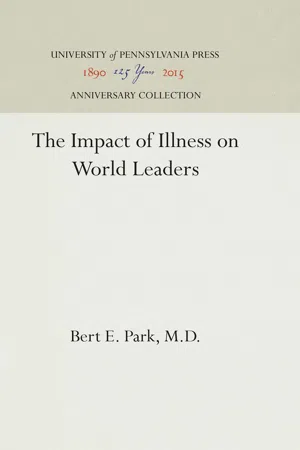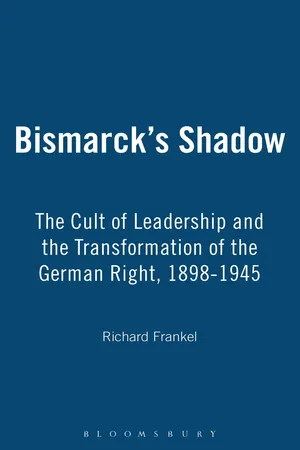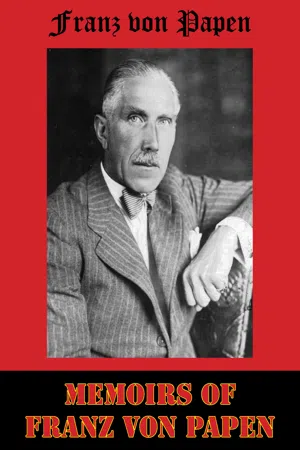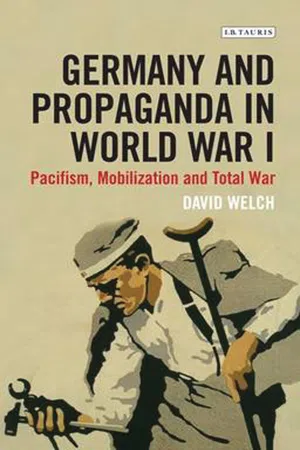History
Paul von Hindenburg
Paul von Hindenburg was a German military officer and politician who served as the second President of Germany from 1925 to 1934. He is best known for his role in appointing Adolf Hitler as Chancellor in 1933, which ultimately led to the establishment of the Nazi regime. Hindenburg's presidency was marked by political instability and the erosion of democratic institutions in Germany.
Written by Perlego with AI-assistance
Related key terms
1 of 5
9 Key excerpts on "Paul von Hindenburg"
- eBook - PDF
The Stab-in-the-Back Myth and the Fall of the Weimar Republic
A History in Documents and Visual Sources
- George S. Vascik, Mark R. Sadler(Authors)
- 2016(Publication Date)
- Bloomsbury Academic(Publisher)
Institutional context The emergence of a cult based around Field Marshal Paul von Hindenburg is one of the strangest occurrences of the Great War, speaking to the need of the German people for a hero/savior and the Emperor’s manifest unsuitability for that role. Kaiser Wilhelm II was totally inadequate as a war leader. 1 His difficult birth left him physically and mentally impaired: a crumpled shoulder and withered right arm detracted from the military bearing he so desired: anesthesia administered to his mother crossed through the placenta and probably was responsible for his violent mood swings, his clear attention deficit disorder and unthinking verbal bellicosity. By the outbreak of the Great War he was distrusted by parties and politicians across the political spectrum. While he was legally Supreme Warlord, the Kaiser spent most of the war at Supreme Command headquarters, where he was reduced to the role of incapable observer. The Emperor’s incapacity left a vacuum that Hindenburg eventually filled. Paul von Beneckendorff und von Hindenburg descended from a distinguished Prussian military family. 2 He served bravely in the Wars of Unification and was present at the proclamation of the new empire in the Hall of Mirrors in Versailles in 1871. In the peacetime army he rose to general rank and was chosen to lead the 3rd Guards division, created for aspiring officers of the newly incorporated western territories of Prussia. After a career that never quite fulfilled its early promise, he retired to the city of Hanover in 1911. In August 1914 he was summoned back into the army to help manage the crisis on the Eastern Front provoked by the unexpectedly early Russian attack on East Prussia. His position was understood to be mostly symbolic. The de facto commander of the eastern Eight Army was Erich Ludendorff, quartermaster-general of the army and hero of the Battle of Liége. - Roger Chickering(Author)
- 2014(Publication Date)
- Cambridge University Press(Publisher)
The two soldiers who made up the so-called “third OHL” provided an intriguing contrast. Paul von Hindenburg embodied the Prussian mili- tary class. 7 He had been born in 1847, the son of an army officer. His own military experience began at the age of eleven, when he was sent to boarding school as a cadet. Then, at the age of eighteen, he was commis- sioned as a second lieutenant in the Prussian army, where he spent the 7 Wolfram Pyta’s Hindenburg: Herrschaft zwischen Hohenzollern und Hitler (Munich, 2007) has largely superseded the older literature, but, for an introduction in English, see William Astore and Dennis Showalter, Hindenburg: Icon of German Militarism (Dulles, VA, 2005); John W. Wheeler-Bennett, Hindenburg: The Wooden Titan (London, 1967). Cf. Walter G¨ orlitz, Hindenburg: Ein Lebensbild (Bonn, 1953); Rudolf Olden, Hindenburg: Oder der Geist der preussischen Armee (Hildesheim, 1982). 74 The war grows total rest of his active career. He fought with distinction in the war of 1870. He then made his way up the ranks to a generalship and the command of an army corps, until he retired in 1911 at the age of sixty-four. His principal traits were his stolidity, a limited intelligence, loyalty to his calling, and a lack of all pretension. The outbreak of war in 1914 prompted his recall to service, now at the head of German forces in the eastern theater. The leading role in the ensuing campaigns, however, fell by calculation to his chief of staff in this theater. This was Erich Ludendorff. 8 In significant respects, this soldier repre- sented the polar opposite of his nominal superior, as well as the symbol of a new dynamic in the German military profession. Ludendorff was not noble. Eighteen years younger than Hindenburg, he had joined the army in 1882. His advancement through the ranks and within the General Staff exposed him to the army’s reigning social prejudices against middle-class officers.- eBook - ePub
- Winston S. Churchill(Author)
- 2016(Publication Date)
- RosettaBooks(Publisher)
The transition from Papen to Schleicher 43 (now murdered) {121} and from Schleicher to Hitler were but an affair of months. In the last phase we see the aged President, having betrayed all the Germans who had re-elected him to power, joining reluctant and indeed contemptuous hands with the Nazi leader. There is a defence for all this, and it must be made on behalf of President von Hindenburg. He had become senile. He did not understand what he was doing. He could not be held physically, mentally or morally responsible for opening the floodgates of evil upon German, and perhaps upon European, civilization. We may be sure that the renowned veteran had no motive but love of his country, and that he did his best with declining mental strength to cope with problems never before presented to a ruler. ❧ ❧ ❧ Dusk deepens into dark. It is time to sleep. Nightmares, hideous choices, unanswerable riddles, pistol-shots disturb an old man’s torpor. Where is the path? Always uphill! Worse to come? Vorwärts 44 —always vorwärts —then silence. 1. Field Marshal Paul Ludwig Hans von Beneckendorff und von Hindenburg (1847–1934). 2. The statue of Hindenburg, erected in Berlin’s Tiergarten in summer 1915 (Churchill mistakes the year), was an emblem of German determination in the Great War, but by 1917 its wooden scaffolding and steps were being stolen for firewood. After the war, it was dismantled, and in 1938 the head was found on a rubbish heap. 3. In 1866, Königgrätz (also known as Sadowa), a town in Bohemia sixty-five miles east of Prague, was the site of the decisive battle of the Austro-Prussian War, in which the Prussians defeated the Austrians in the second of Bismarck’s wars of aggrandizement - eBook - ePub
- Stephen J. Lee(Author)
- 2013(Publication Date)
- Routledge(Publisher)
The committee that framed the constitution of the Weimar Republic opted for a strong executive Presidency and a subordinate Chancellorship. This was intended to provide continuity with the monarchy of the old Kaiserreich and was in complete contrast to the weaker and more formal presidency of the German Federal Republic after 1948. The role of the President was to create a safe environment for the new Republic’s survival and for the domestic and foreign policies pursued by its Chancellors. On the assumption that there might well be crises threatening the overturn of the state, he was given emergency powers (see pages 48–9). This meant that particular importance attached to the personality, attitudes and policies of the two incumbents — Friedrich Ebert (1919–25) and Paul von Hindenburg (1925–34).There was a significant contrast in the backgrounds of the two men before they became President. Neither had a university education (in contrast to the Republic’s twelve Chancellors, two-thirds of whom had a doctorate). Ebert had been apprenticed as a saddlemaker and established his political career as a trade unionist. Elected to the Reichstag in 1912 to represent the SPD, he had initially supported the war effort before becoming increasingly concerned about the drift to military dictatorship under Hindenburg and Ludendorff. He did not see military service himself, something later thrown at him by the political right. In 1916 he became the leader of the SPD in the Reichstag and tried desperately to prevent the split between the two wings of the party. His was the main SPD voice in the cabinet of Prince Max and he then became provisional Chancellor of the new republic that was proclaimed, against his wishes, by Scheidemann on 9 November. He remained head of the provisional government until January 1919.Hindenburg was already in military service when Ebert was born. He served in the Austro—Prussian War (1866) and the Franco—Prussian War (1870–71). Forty years later, he retired as lieutenant general in 1911. He was recalled to active service during the First World War, establishing a military reputation for the German victories against the Russians at Tannenberg and the Masurian Lakes. In August 1916 he was appointed Chief of General Staff. With Ludendorff and the Kaiser, he formed the military government which replaced the Chancellorship of Bethmann Hollweg in 1917. Following Germany’s defeat, Hindenburg entered a second retirement until 1925, when he once again entered politics on the death of Ebert. - No longer available |Learn more
Hindenburg, Ludendorff and Hitler
Germany's Generals and the Rise of the Nazis
- Alexander Clifford(Author)
- 2021(Publication Date)
- Pen & Sword Military(Publisher)
The Hindenburg Republic: Hindenburg as the Arbiter of German Politics 217 to form a new cabinet were well under way? Ullirch also notes that in the last few days the so-called Eastern Aid scandal began to unravel as it emerged that landed aristocrats had been misusing public funds. Several of Hindenburg’s landowning friends were implicated and it was a scheme he had championed; perhaps it was best to turn a new leaf, especially as the president held Schleicher responsible for allowing his name to be dragged through the mud. 403 Further evidence against Schleicher arrived when Hindenburg received General Werner von Blomberg, commander of Reichswehr forces in East Prussia. Blomberg was actually far more pro-Nazi than most senior army officers and was persuaded by his chief of staff, Colonel Walter von Reichenau (a NSDAP sympathiser), to advocate a Hitler government. Blomberg told the president that the army did not support Schleicher’s scheme for a showdown with the Nazis, that the army would disintegrate if asked to fight the SA due to significant political support for the NSDAP amongst younger officers, and that the military would welcome a ‘National Front’ administration led by the Führer. 404 Blomberg’s intervention was crucial; Hindenburg had always been influenced by ‘army opinion’ and, up to this point, it had been Schleicher who had wielded it as a political weapon, acting as a spokesperson for the officer corps within the Presidential Palace, often just to get his own way. Now, he had (unbeknownst to him) been usurped, and Blomberg’s testimony fatally undermined Schleicher’s own claims about the viablility of a temporary dictatorship, for the chancellor had by the 26th realised that he had little chance of persuading the president to grant him emergency powers, rendering his position all but untenable. - eBook - PDF
- Bert E. Park, M.D.(Authors)
- 2016(Publication Date)
Hindenburg's reliance upon others fostered the breakdown of Ger-many's parliamentary system as the increasingly incapacitated President was perversely forced to play a more active role. This proved to be one major factor leading to a striking degree of turmoil, confusion, and in-trigue during the last years of the Weimar Republic. Hindenburg's ob-vious weakness allowed divisiveness among his subordinates to flourish. This brought out self-serving intriguers from the political woodwork. Chief among these was General Kurt von Schleicher, who fancied him-self the army spokesman for political affairs. Probably no one individual exercised more influence over Hindenburg, and consequently over the course of German politics, than did this German Rasputin. He was the critical link between the succession of chancellors who passed through the door of the Weimar Republic and down the darkening corridor of the Nazi movement to Adolf Hitler's chamber beyond. Nothing speaks more to the depths of cynicism and intrigue in these years (and by inference to Hindenburg's increasing compromise) than the ease with which Schlei-cher manipulated his aged superior. Through Hindenburg's son, Oskar, who was serving as personal adjutant to his father, Schleicher easily gained admittance to the presidential palace at a moment's notice. This resulted in what the historian William Halperin called a palace cama-rilla that eventually took Hindenburg completely in tow. 6 Three chan-cellors and numerous subordinates were axed indirectly by Schleicher's hand under the myopic eye of the malleable President. This cynical ma-nipulator adeptly cleared the cobwebs from the aging President's mind regarding actions, appointments, and resignations. He used those same cobwebs to weave threads that bound Hindenburg to a process that para-doxically unraveled any hope of orderly government function. - eBook - PDF
Bismarck's Shadow
The Cult of Leadership and the Transformation of the German Right, 1898-1945
- Richard Frankel(Author)
- 2004(Publication Date)
- Berg Publishers(Publisher)
56 In doing so, he was clearly tapping into that most central element of German political culture: the cult of leadership. “One longs for Bismarck-words,” the Pommersche Tagespost wrote in January 1918, “one longs for a Bismarck, for a truly great one in the midst of the greatest time. Such longing for political lead-ership of Bismarckian greatness is today the key-note of völkisch voices. If only now a man like Bismarck would come!” 57 As it turned out, Tirpitz was not to be the man. Still, Germany did have another potential savior, a man perhaps more closely associated with blood and iron. Field Marshal Paul von Hindenburg emerged early in the war as the most prom-ising ‘new Bismarck.’ 58 His physical stature alone must have reminded people of the Reichsgründer , but his crushing victory over the Russians at the Battle of Tannenberg provided him with the critical aura of success. Taking a cue from the Bismarck Cult, many German cities began erecting Hindenburg towers. The first one, in Berlin’s Königsplatz, was a massive wooden statue, into which people would drive an iron nail. In the shadow of the Iron Chancellor, thousands drove their nails home, thereby transforming the wooden figure into an ‘Iron Hindenburg’. 59 It was an impressive display of the effectiveness of the Bismarck Cult in preparing the ground of German political culture in the years before 1914. The ritual and rhetoric of the Cult would prove flexible enough during the war to embrace a figure like Hindenburg and place him alongside the Iron Chancellor, 98 • Bismarck’s Shadow seeing in him a possible fulfillment of the Bismarckian gospel of salvation through a god-given leader. At Bismarck ceremonies and in the press, Germans often con-nected the Reichsgründer and the Field Marshal in their dreams of a return to pow-erful leadership. At a Bismarck birthday celebration organized by the Fatherland Party, Dr. - eBook - ePub
- Franz von Papen, Franz von Papen, Brian Connell(Authors)
- 2015(Publication Date)
- Lucknow Books(Publisher)
Many officers with whom I had trained or served had come to hold high appointments in the Reichswehr. By tradition and instinct the armed forces were required to be a completely non-political instrument. Once the monarchy had disappeared as the culminating point in their hierarchy, and party politicians had taken over the representation of the Reich, it was not easy to keep this instrument of law and order divorced from the conflict of opinions. It should not be forgotten that in the civil disorders of the early ‘twenties, when the very framework of the State seemed to be crumbling, the Army played a decisive rôle behind the political scene. The election of Field-Marshal von Hindenburg to the Presidency served to stabilize the situation. Between 1925 and 1930 it continued to become normal, but under the threat of a new crisis, calculated to disrupt the foundations of our social life, the Army again became an important factor. We shall see that the Reichswehr did not intervene as a body in the affairs of State, but that the opinions of its outstanding personality, General von Schleicher, had a decisive influence on the decisions of the President. The growing tension between the right wing parties, particularly the Nazis, and the Government was viewed by the Army with increasing concern. Schleicher sought someone to head the Government who had close contacts with the centre parties while preserving the sympathies of the right. What was needed was a man of conservative tendencies, closely allied to the Zentrum Party, which was one of the pillars of the Weimar Coalition.It may be something of an over-simplification, but it is probably true, to say that Schleicher’s suggestion to offer the Chancellorship to me more or less represented the vote of the Army.Its three outstanding officers in the post-war period were Hindenburg, General von Seeckt and Schleicher. I had not known Hindenburg before the war. As a member of the General Staff I came into contact with the leading personalities of Supreme Headquarters, including Ludendorff, who was head of the planning and operational section at the time. During the war, when I had to report from time to time to Supreme Headquarters or visited my friend Lersner, who was the Foreign Office liaison officer there, I not infrequently saw the senior officers. After the Easter battle of Arras I was called upon to make a personal report to Ludendorff, and also saw Hindenburg. In August 1918, after the critical failure of the spring offensive, when I hurried back from Palestine to report on my fears for the situation there, I saw Hindenburg again. I remember how impressed I was by his calm and determined attitude in the face of the rapidly deteriorating military situation. - eBook - PDF
Germany and Propaganda in World War I
Pacifism, Mobilization and Total War
- David Welch(Author)
- 2014(Publication Date)
- I.B. Tauris(Publisher)
He recognized also the need to preserve the Burgfrieden and restore a degree of harmony to a war-weary and divided country. In the view of the OHL, the weak and prevaricating Bethmann Hollweg had failed to provide strong leadership. Although it had succeeded in replacing Hollweg, Civilians ‘Fall-in’ 205 the OHL remained incensed with the Reichstag’s Peace Resolution which it was determined to undermine. Jurgen Kocka has argued that the war stimulated a new type of anti-parliamentary mass movement that pushed Hindenburg and Ludendorff to-wards a plebiscitarian military dictatorship. 2 Indeed, Ludendorff was virtual dictator of Germany during the last two years of the war. He was an in-triguing character who, through considerable professional dedication, rose from Major General in 1914 to Senior Quartermaster-General in Septem-ber 1916. While Hindenburg remained the popular hero of Tannenberg, his energetic and ruthless subordinate assumed the dominating role within the OHL. He shrewdly exploited the vacuum created by an indecisive and vac-illating Kaiser and the frailty of the civilian leadership. Whether he set out to make himself indispensable is open to question. Politically he was more astute than the traditional Prussian type of officer. One of his earliest biog-raphers claimed that a sense of dedication to what he believed to be the best interests of Germany, rather than naked lust for power, dictated his actions. Ultimate responsibility for his mistakes must rest with the Wilhelmine system that allowed quasi-dictatorial powers to fall into the hands of a professional soldier patently ill-equipped to deal with such responsibilities. 3 While Ludendorff possessed the virtues and vices of the Prussian officer corps and embraced some of the conservative leanings of the late-nineteenth-century cavalry officer, he did not hanker back, unlike Hindenburg and other aristocratic officers, to the good old days of cavalry charges.
Index pages curate the most relevant extracts from our library of academic textbooks. They’ve been created using an in-house natural language model (NLM), each adding context and meaning to key research topics.
